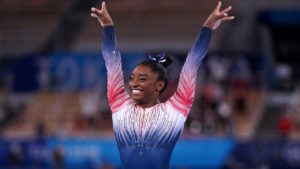Simone Biles Deals With a Family Death, Makes Her GOAT Status Mean Even More With an Unforgettable Final Olympic Act
Biles' Bronze Medal in Courage is Even Greater Than Gold
BY Chris Baldwin // 08.03.21Simone Biles winning a bronze medal in Tokyo is a testament to Olympic-sized courage and overcoming adversity.
Simone Biles arrived in Tokyo as the Greatest Gymnast of All Time, the GOAT who NBC’s entire Olympic-sized ratings dreams depended on, the flawless pitchwoman and idol for little girls everywhere. She departs as something even greater.
Biles showed the type of courage we still don’t expect from sports heroes in 2021. The courage to admit when everything is not all right. The courage to defy the Olympic machine and what the world expected of her. The courage to chart her own, healthier path.
And yes, the courage to win a bronze medal despite mental health burdens, a family tragedy, unfathomable pressure and a case of the gymnast-crippling twisties. In the process, Biles did her hometown of Spring proud. Like always.
Winning bronze in the balance beam while using a simple dismount that she estimates she hasn’t used since she was 12 years old is no small feat. But it’s not close to the greatest one of these Tokyo Olympics for Biles.
That would be having the guts to step away from the world spotlight moments she battered her body to reach over five long years of training. And then having the resolve to step back into that blinding fray to compete in one final event — all but assuredly the last Olympic event of her unparalleled career — even though she knew she still wasn’t close to her best.
“That I’m a fighter and I don’t give up,” Biles tells NBC when asked what she hopes her final Olympic moment shows. “And no matter what you go through, even if you have to drop out of your biggest competition, it’s going to be all right.”
Maybe someone else will realize that it’s all right to step away — from a job, from school, from seemingly crushing obligations — to deal with a mental health crisis through Biles’ example. In many ways, that would be as great a legacy as the four gold medals Biles won in Rio.
Even greater. For inspiring someone else in trouble to seek help is the type of quiet, powerful real life heroics that sports seldom deliver.
In her return to competition — and her return to the public spotlight of answering questions — Simone Biles does not pretend to have all the answers. Instead, she admits how torn up and confused she is about the whole ordeal. About feeling the need to step away and withdraw from event after event.
“I kind of felt embarrassed with myself,” Biles says in her final press session in Tokyo. “. . . My problem was, why were my body and my mind not in sync? And that’s what I couldn’t wrap my head around.”
Biles almost gave up on the Tokyo Olympics after they were delayed by the COVID 19 pandemic last year. She could not fathom putting her body through another grueling full year of training. A body that had already been through years of acrobatic abuse — and sexual abuse at the hands of Larry Nassar, the monster doctor the USA Gymnastics federation enabled.
Then, as Biles’world seemed to be collapsing around her in Tokyo, a close aunt of hers unexpectedly died just two days before she returned to competition.
Biles never tried to turn this into a redemption story wrapped in a neat bow, though. Yes, she won a bronze. But she’s also still struggling. And that’s OK, too.
By not trying to come up with a simple explanation, by admitting the issues she is suffering through defy a quick cure, The Greatest of All Time is setting another powerful example. Sometimes you’re just struggling — and you don’t know exactly why.
And that’s all right, too.
Maybe someone else will realize that it’s all right to step away — from a job, from school, from seemingly crushing obligations — to deal with a mental health crisis through Biles’ example. In many ways, that would be as great a legacy as the four gold medals Biles won in Rio. Even greater.
Few people on earth can relate to what Simone Biles has been through over the last five years since Rio. I witnessed a crowd of girls that grew and grew and grew and followed her when she went to a Houston Rockets game with her family, until they resembled a pied piper’s procession. This has been Biles’ life almost everywhere.
The pressure — and attention — on a 24-year-old woman who’s a relatively reserved and private person at heart kept building and building as Tokyo finally approached.

These Olympics did not turn out like Biles and her team expected. They did not go as NBC, gymnastics and the world all but demanded.
Only the worst of the cable news blowhards, sports argument fiends and Twitter trolls would rip Biles for putting her health first — and setting a powerful example. The fact that there are still so many of those should not surprise anyone in 2021.
Biles admits to having heard “a lot of bad stuff” along with the good. But her competitors — including balance beam gold medalist Guan Chenchen — outright cheer for her even as they fight for their own medals. When Biles completes that much simpler than usual dismount — hands tucked behind her legs to help fight the twisties, something she hasn’t done since before she was a teenager — she puts her right hand over her heart.
And breaks into a big smile. Sometimes, it’s not about medals. Simone Biles has done the anything for gold routine. This is different. This is about showing the world a healthier way.
“At the end of the day, we’re not just entertainment,” Biles tells the world’s press in Tokyo. “We’re humans.”
We all are. It’s OK for anyone to be human. To put their health first. Some will say that Simone Biles “only” won a bronze. The truth is The GOAT broke all kinds of new barriers in Tokyo. And showed a new way.
Like a champion. Like always.




























_md.jpeg)

